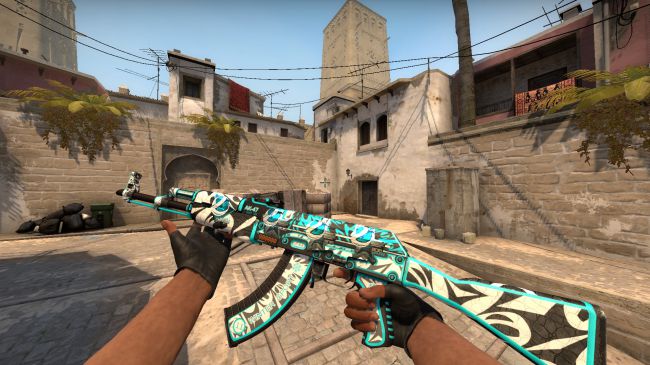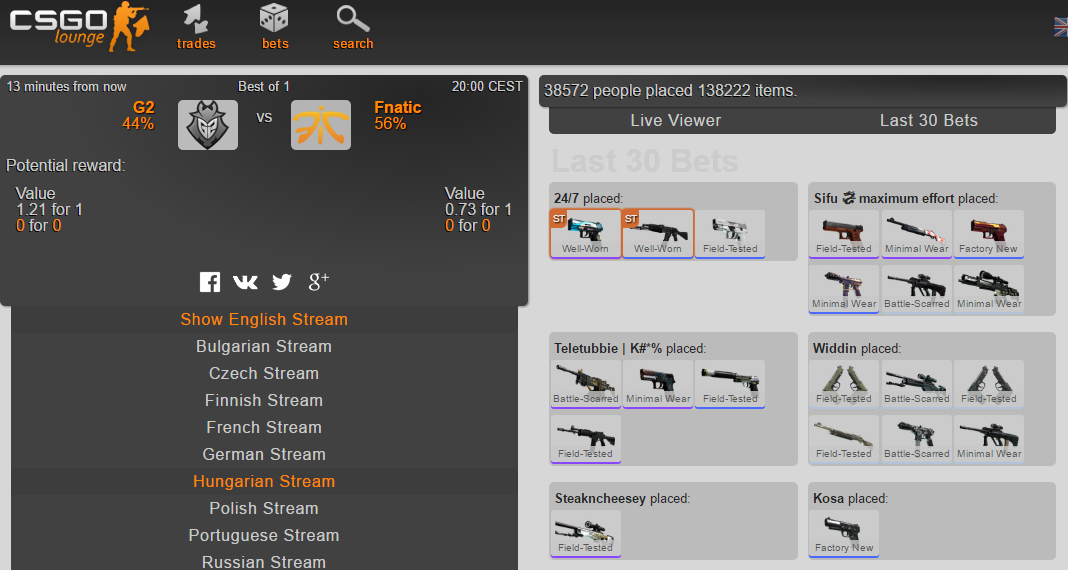UK Gambling Commission says children as young as 11 are getting into skin gambling
A year-end report sounds the alarm on the "normalization" of online gambling among young people.

For the first time ever, the UK Gambling Committee's year-end report on Young People and Gambling has looked into "awareness and participation rates" of skin gambling (if you're not sure what that is, here's a primer). The report states that, "based on the description provided within the questionnaire," 45 percent of children aged 11-16 knew about skin gambling, and 11 percent said they had placed bets with in-game items at some point in the past.
"'Skins' are in-game items, used within some of the most popular video game titles. They provide cosmetic alterations to a player’s weapons, avatar or equipment used in the game," the report states. "Skins betting sites allow videogamers to wager cosmetic items rewarded in-game or purchased for real money on a digital marketplace, accessible from the UK for several years."
A BBC report on the Gambling Commission paper leads with the statistics on skin gambling and then says that roughly 370,000 11-16 year olds in England, Scotland, and Wales reported spending their own money on gambling at least once in the prior week. But the context is misleading: The number is accurate, at least within the survey's margin of error, but it includes all forms of gambling, including slot machines, scratch cards, and wagers with friends ("five bucks says you can't make that jump"). Furthermore, the figure "represents a continuation of the longer-term decline seen since 2011," when 23 percent of 11-15 year-olds reported taking part in some form of gambling during the preceding week.
Prevalence of gambling with in-game items increases with age, from three percent of 11 year-olds to 14 percent of 14-16 year-olds, and was higher among children who had spent money on other forms of gambling over the past week, or who had played "online gambling-style games," like casino games, slot machines, or poker. In fact, the rate of playing those games matches the incidence rate of skin gambling, at 11 percent.

It's the ability to convert in-game items into cash that denotes the activity as gambling for the purposes of the report, rather than the actual conversion itself—the fact that the skins could be converted into cash, not whether they actually were. That's also how the concept was introduced to survey respondents: "When playing computer games/app it is sometimes possible to collect in-game items (eg. weapons, power-ups and tokens). For some games, it is possible to bet these in-game items for the chance to win more of them."
"The Gambling Commission takes the view that the ability to convert in-game items to cash, or to trade them (for other items of value) means they attain a real-world value and become articles of money or money’s worth. Where gambling facilities are offered to British consumers, including with the use of in-game items that can be converted into cash or traded (for items of value), a gambling license is required," the report says. "Tackling operators making gambling facilities available to children is one of the Gambling Commission’s priorities."
In other words, it's the people running unlicensed gambling sites who are liable to be targeted by the Gambling Commission, and not the games themselves, or the companies who make them. In fact, earlier this year the commission successfully prosecuted YouTuber Craig "Nepenthez" Douglas and his business partner Dylan Rigby, who ran the FUT Galaxy website that enabled gambling on real-world soccer matches using FIFA 17 virtual currency. But that currency could also be exchanged for real money, which fell afoul of the UK's Gambling Act and cost the duo £255,000 ($340,00) in fines.
Keep up to date with the most important stories and the best deals, as picked by the PC Gamer team.
"Because of these unlicensed skin betting sites, the safeguards that exist are not being applied and we're seeing examples of really young people, 11 and 12-year-olds, who are getting involved in skin betting, not realizing that it's gambling," Gambling Commission chief executive Sarah Harrison told the BBC. "At one level they are running up bills perhaps on their parents' Paypal account or credit card, but the wider effect is the introduction and normalization of this kind of gambling among children and young people."

Andy has been gaming on PCs from the very beginning, starting as a youngster with text adventures and primitive action games on a cassette-based TRS80. From there he graduated to the glory days of Sierra Online adventures and Microprose sims, ran a local BBS, learned how to build PCs, and developed a longstanding love of RPGs, immersive sims, and shooters. He began writing videogame news in 2007 for The Escapist and somehow managed to avoid getting fired until 2014, when he joined the storied ranks of PC Gamer. He covers all aspects of the industry, from new game announcements and patch notes to legal disputes, Twitch beefs, esports, and Henry Cavill. Lots of Henry Cavill.

